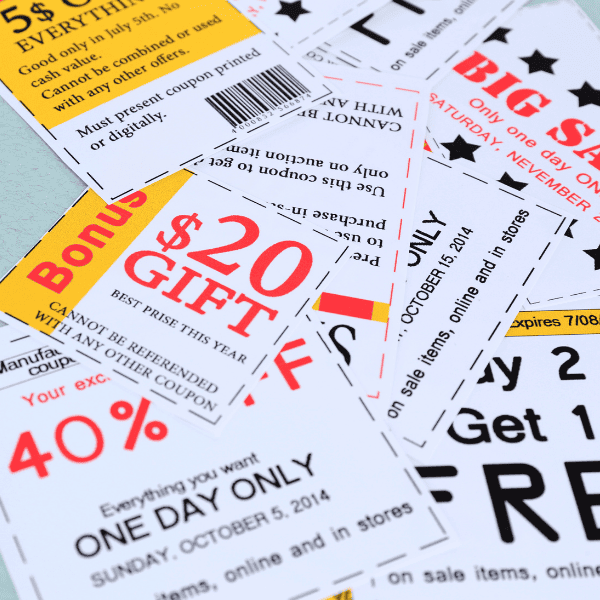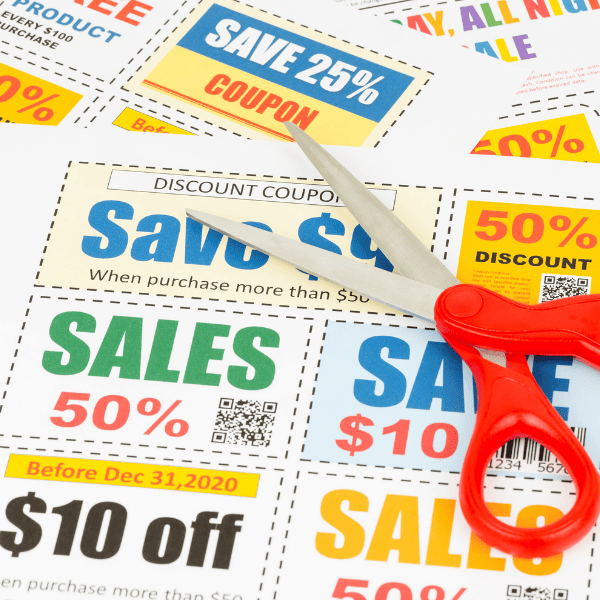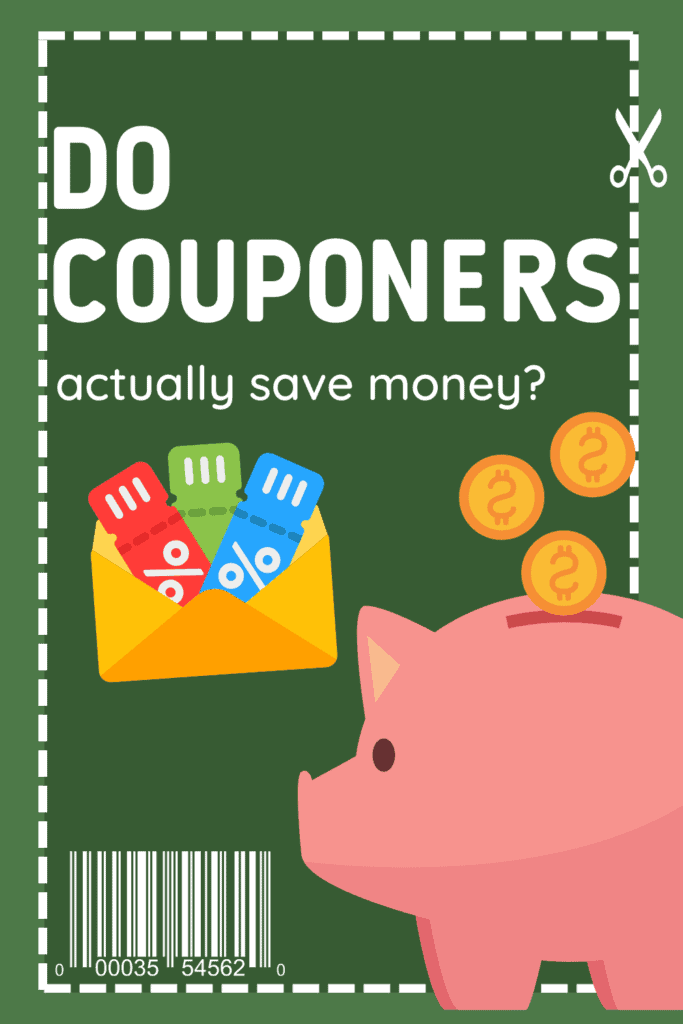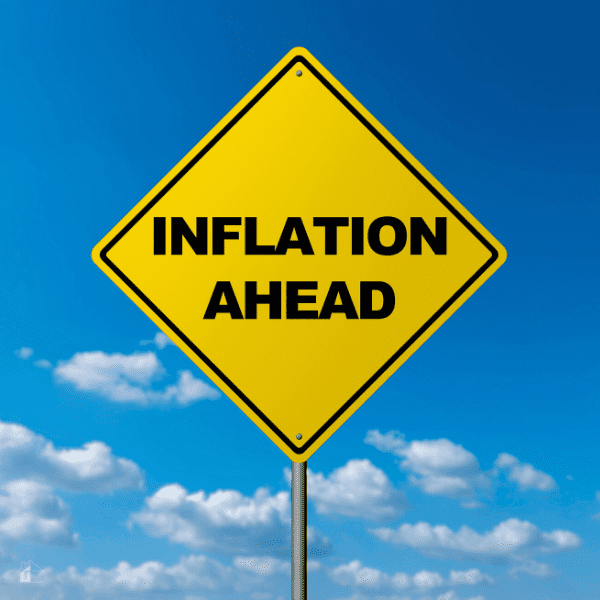Do Couponers Actually Save Money?
This post may contain affiliate links which might earn us money. Please read my Disclosure and Privacy policies hereDo couponers actually save money? Let's find out! Are you tired of hearing about extreme couponing and wondering if it's really worth the time and effort? With claims of saving thousands of dollars, it's easy to be skeptical. But before you dismiss the idea of couponing altogether, let's take a closer look at whether or not couponers actually save money.
With factual data, we'll explore both the benefits and potential hidden costs of couponing. So, are you ready to find out if couponing is worth your time? Let's dig in.

Do couponers actually save money?
Couponers can save a lot of money. Couponing is an effective way to reduce the cost of groceries, toiletries, and other household items. Couponers can often buy items for significantly less than their normal retail price by taking advantage of coupons, discounts, and sales promotions.
For example, if you purchase three boxes of cereal with a buy-three-get-one-free coupon, you'll get one box for free. Similarly, when a store offers a discount on an item with the purchase of other items, couponers can often get more bang for their buck by combining those discounts and coupons.
Also, if you are willing to take the time to compare prices between stores, you can often find stores that offer the same product for a lower price. In this way, couponers can save money by taking advantage of these offers and buying items at the lowest possible price.
Overall, couponing is an effective way to reduce your grocery bill and save money on household items. With the right strategy, it's possible to significantly cut the cost of your groceries and other household items. This can definitely help keep more money in your pocket over the long term!
You might enjoy these posts:
- How to Use a Coupon Savings Calculator (Free Spreadsheet)
- 6 Tips To Know Before Buying Cheap Food In Bulk
- What Are The Advantages Of A Shopping List?
Do couponers actually save money?
Couponing can be a great way to save money on purchases, but it's not always worthwhile. While some people can save a lot by being vigilant and persistent, others may buy more than they need or waste money on items they won't use. One study found that the average savings from couponing are just $11.60 a year per person.
That said, coupons can still be a valuable tool for anyone looking to save money on things they were already planning to buy, especially if they plan strategically by buying in bulk only what they know they'll use.
The Truth About Couponing
Couponing has been around for generations and is seen as a great way to save money on purchases. However, the question remains: do couponers actually save money?
Couponing involves searching for deals and discounts on goods and services by cutting out ads, searching for online promo codes, and sometimes even using expired coupons to save at checkout.
While some people are willing to spend 40 hours a week mastering their coupon game, others are just shopping for discounts when they're ready to make a purchase. In reality, the truth about couponing lies somewhere in between.
The Average Savings for Couponers
According to a study on consumer spending, couponing could save the average household over $1000 per year. Specifically, using coupons to purchase food, household items, entertainment, and clothing could lower household costs by 6.4%.
In addition, signing up for rewards programs and email lists could lead to even more savings. The study showed that customers who were members of loyalty programs saved an average of 16.2%.
However, the study also revealed that households could save more money by taking advantage of store sales and discounts. By bypassing coupons altogether and simply timing their purchases, they could save up to 21% on goods and services.
Full-time Couponers: Fact or Fiction?
Extreme couponers make a full-time job out of collecting, organizing, and strategizing the best scenarios for redeeming their coupons. Many couponers dedicate more than a 40-hour work week to maximize their deals.
While the TLC show “Extreme Couponing” may have painted the picture that anyone could save significant amounts of money through couponing, the truth is that it is difficult to maintain without a significant time commitment.
As Donna Montaldo highlights, the scenarios presented on the show rarely accounted for the significant amount of time spent collecting coupons and the limitations that stores may have on accepting coupons, to begin with.
Coupon Influencers: Do They Really Help?
Coupon influencers have gained a huge following on social media platforms and claim to share exclusive deals with their followers. But do their claims really help couponers save money?
It's important to remember that influencers have a vested interest in promoting products and deals to their followers.
As Kevin Johnston of FinMasters points out, “Coupon influencers love to share their ‘big scores' with readers; some have even helped others find coupons.” However, it's important to question their motives and do your own research before blindly following their advice.
As with any deal, do your homework and ensure the product or offer fits your needs and budget well.

The Fear of Missing Out (FOMO)
The fear of missing out (FOMO) is a powerful motivator that drives many couponers to stock up on items they may not need. This urgency to act quickly can result in poor decision-making and overbuying.
According to a survey, 38% of shoppers end up buying more than they intended due to coupons, while 83% admitted that coupons influence their buying behavior.
While saving money is great, exercising restraint and weighing the discount's true value against the item's cost and how much of it you'll use is essential. As they say, don't let FOMO drive your couponing habits.
Hidden Costs of Couponing
Although couponing can save you money, watching out for hidden costs is important. One major pitfall is the tendency to overbuy when using a discount. Couponers may purchase more than they need just because they have a coupon. Another cost to consider is time.
While the savings may seem tempting, it can be easy to get carried away searching for coupons and deals. Ultimately, it's important to assign a value to your time and compare it to the value of the coupons you're earning.
As the saying goes, time is money!
Overbuying: The Downsides of Quantity Discounts
While buying in bulk and taking advantage of quantity discounts may seem like a good deal, overbuying can lead to wasted money and resources. To prevent this, be sure to use the first-in, first-out method when organizing your goods, and consider donating what you can't consume in time.
If you buy too many items on sale and they expire before you can use them, it can become a significant issue..
Additionally, overbuying can lead to clutter and disorganization, making it harder to track what you need and use.
As Ramsey Solutions suggests, “Stay disciplined in your shopping and only buy what you actually need and will use.” Remember, saving money is about making intentional choices, not just grabbing any deal that comes your way.
Is It Really Worth It?
When the value of couponing, it's important to consider return costs. Is it worth the time and effort spent searching for deals and clipping coupons if you return items or buy things you didn't need?
It is important to be mindful of our purchases and not blindly seek out discounts. The aim should be to avoid paying full price, but must also consider if the item is worth the investment before making a purchase.
Time is Money: Value Your Time and Coupons
When it comes to couponing, time is money. While coupons can save you money on your purchases, it's important to factor in the time and effort it takes to clip, organize, and use them.
Some people are willing to spend 40 hours a week mastering their coupon game, hoping to get money back, save double, or come home with five gallons of generic laundry detergent. It's important to value your time and weigh the benefits of couponing against the required effort.
However, is couponing worth it? What percentage is really saved? Ultimately, it depends on each individual's lifestyle and coupon strategy.
By being strategic in their couponing approach, households can save money while limiting the time and effort spent on deals. As long as you shop smart and use coupons responsibly, you'll be sure to save more than you invest.
Even spending as little as 10 minutes a week clipping and organizing coupons can still save you an average of $7.00 on your grocery bill. As the saying goes, every little bit helps.

Strategic Couponing: Making It Worth It
When it comes to couponing, it can be both a money-saver and a money-waster, depending on how it's done. The trick is to strategically coupon to make it worth it.
To do this, couponers need to take the time to research and compare prices. Look for coupons that offer worthwhile savings and read the fine print in order to understand any restrictions. It is also important to be mindful of expiration dates, hidden costs, return fees, and quantity discounts in order to avoid overbuying or wasting money on products you won't use.
By couponing strategically, households can save money while limiting the time and effort spent on deals. As long as you shop smart and use coupons responsibly, you'll be sure to save more than you invest!
Above all, it's important to remember that couponing is a long-term commitment that requires patience and dedication in order to reap the rewards. With some research and savvy shopping, you can save money and come out on top!

What is the trick to couponing?
When it comes to couponing, there are a few things to keep in mind to save the most money possible. Here are some tips to get you started:
- Plan ahead: Know what items you need before heading to the store so you can search for the best deals and coupons.
- Take advantage of loyalty programs: Many stores offer rewards programs that can help you save even more money.
- Use technology to your advantage: Many couponing apps and websites can help you find the best deals and coupons available.
- Combine coupons with sales: The biggest savings come when you stack coupons with items that are already on sale.
- Be organized: Keep your coupons organized and easily accessible to avoid missing out on savings.
- Research and compare: Take the time to research prices and discounts in order to get the best value.
Finally, don’t forget to enjoy the savings! Couponing can be a great way to save money, so make sure you take advantage of all your hard work.







I love using coupons and they save us a lot of money over the course of a year.
They do for us too.
I love using coupons and getting deals! I get a high from saving money, which doesn’t hurt and I stock up on products for about a year so I won’t have to buy them for a while. They really can help you get out of debt once you know how to use them! Love this post! =)
Coupon when use correctly can help you save money. I hear you when yu get that “high” it such a good feeling.
I don’t use coupons much, but I was a fanatic about them years ago when I was first married.
Really? I don’t think I became was that bad…. I don’t think. Maybe my husband might have a different view about it. Thanks for commenting Rebecca.
I love couponing and I LOVE this post! Thank you for the info:)
Thank you Happy! We love them too!
We tried couponing but it was so hard for us because there weren’t many coupons we would actually use! So glad you were able to get out of debt using them! I haven’t figured it out yet!
Tip I will give you should use coupon the way it works for you and your family. I don’t use all coupons. Only coupons that work for me and my family. Any amount you save is worth it. We got out of debt because we used what we needed with a budget if not… 🙂 Thank you for commenting Tara.
There are no cupons here. But I have noticed that planning ahead and keeping track of what you buy and how much money you use does make a huge difference in spending.
It sure does, Joanna. Even without coupons, planning is key to saving money.
Great tips! I’m definitely a coupon-user and I like to see when it’s made a difference on my receipts 🙂
Do you grab the receipt and go straight to the bottom part where is says the amount or percentage you saved? Cause I have caught myself doing that …. a lot!
Yep, I do that ALLLLL the time!